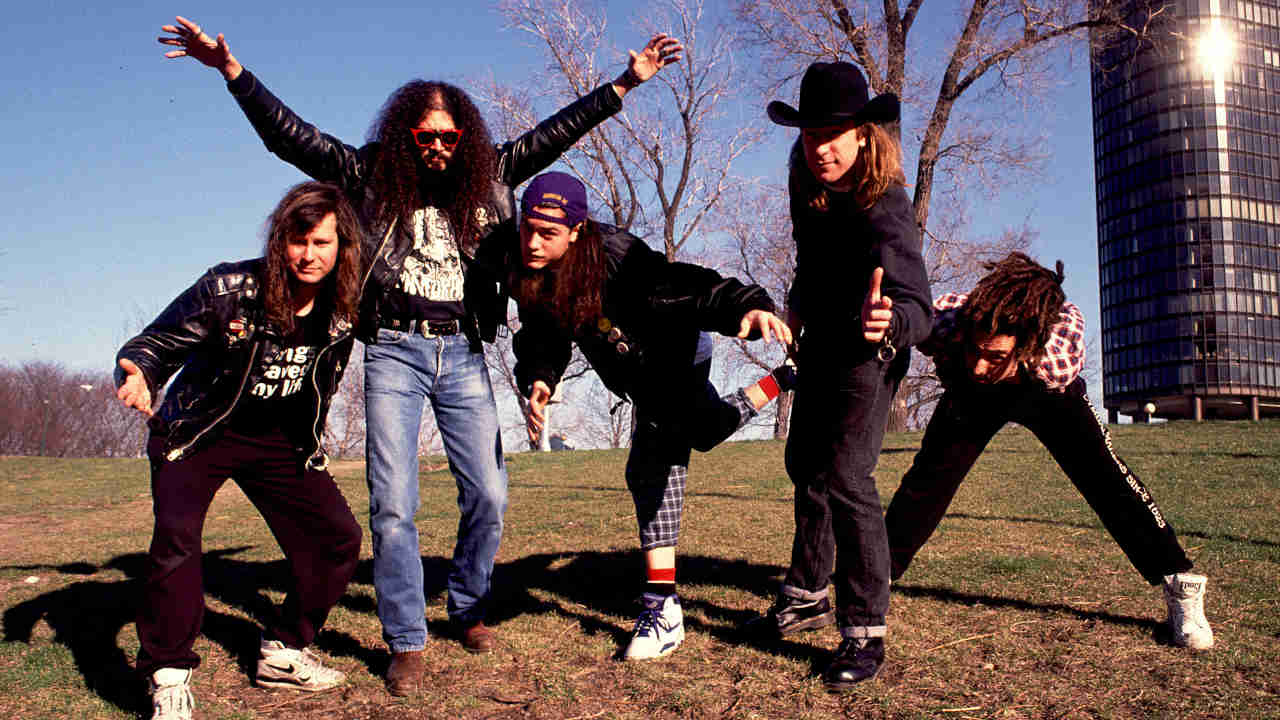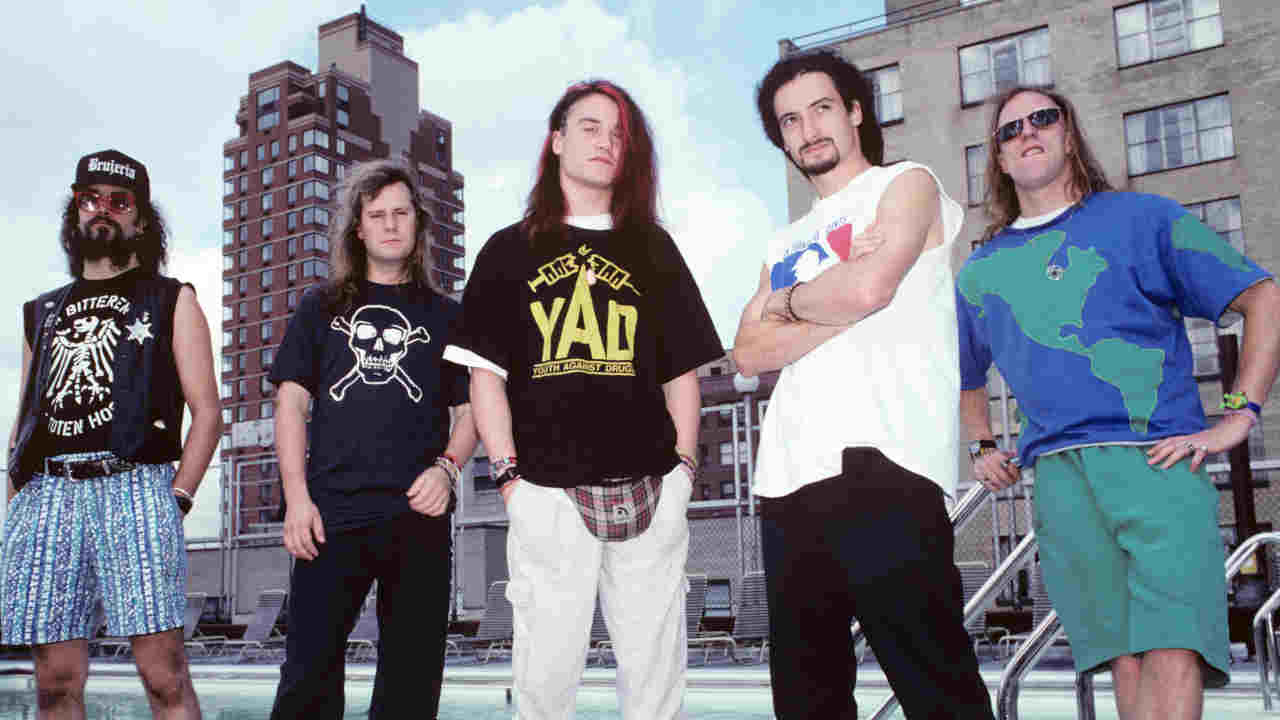1990 was the year everything changed for Faith No More. The previous summer their third record The Real Thing had faltered commercially and the band’s label were losing faith rapidly. Worse still, efforts to generate buzz through a star-studded launch show at The Roxy in Los Angeles did more to vindicate suspicions that the band had turned their post-punk, anti-establishment roots after recruiting new vocalist Mike Patton to replace original singer Chuck Mosley. As an LA Times review of the show put it, “Is Faith No More, which four years ago set the standard for post-punk cynicism with its rap metal anthem We Care A Lot now a bandwagon-jumper deserving that cynicism itself?”
But if The Real Thing was Faith No More selling out, they were doing an exceptionally bad job of it. Lead single From Out Of Nowhere had disappeared without a trace in the US in October 1989, so as the year approached its end the label decided to try a different tactic; they let the band pick the next single. To a man, the unanimous choice was Epic, the record’s second song and one which stylistically harkened back to the proto-rap-metal of We Care A Lot, a song which had seen the band chart in the UK four years previous. But Faith No More were a different band now; gone was the slapdash charm of the Chuck Mosley-era, they were now confident genre-melding masters of alternative metal.
“The band definitely thought The Real Thing was more radio-friendly or accessible,” said producer Matt Wallace in 2019. “In their mind Faith No More was pop music, but the reality was that they weren’t; they later became part of the pop milieu thanks to the juggernaut that was Epic. Their idea of what pop is was what helped to make pop different.”

The change didn’t come overnight, however. Released on January 29, 1990, Epic seemed as ill-fated as its predecessors, radio barely paying attention while MTV aired its music video just twice before shelving it. Ultimately, an anarchic performance at the London Astoria on February 7, 1990 was the catalyst for the band’s airplay; a collapsed crash barrier and electrically-charged atmosphere prompting US Warner Brothers exec Randy Skinner to call home and insist the band receive a renewed promotional push – including getting the Epic video back on MTV.
That same week, Epic achieved its first chart position in the UK where it reached #37 in February. By May both US radio and MTV had been clued in to the fact FNM were exploding overseas, particularly when the single topped the Australian charts. The video was put on heavy rotation and FNM finally achieved a US top 10 when it reached #9 of the Billboard Hot 100 on September 8, 1990: a little over a year from the release of The Real Thing The signs were clear: alternative metal was going mainstream.
“Before Nirvana blew it all up, there were people in the metal community that were holding tight to it all,” drummer Mike Bordin told Hammer. “We really identified with bands like Metallica because they came in with this punk rock energy. We also loved Slayer; that’s been well documented. But back then thrash was just a subgenre; the biggest songs were Love In An Elevator and Still Of The Night, stuff like that. They aren’t bad songs, but they weren’t us either.”
While they were by no means the first to do it, Faith No More helped ferment a new breed of metal that could amorphously move between everything from funk, soul and R&B right up to thrash and hardcore. Rather presciently, the band weren’t entirely comfortable being lumped in with anybody else in the nascent funk or rap rock and metal camps however – something they would later echo when looked at as godfathers for the nu metal movement at the end of the decade.
"We didn't come up in the funk-thrash thing," Mike Bordin said to Spin in 1990. "Maybe some people put us at the head of it but it's something we never championed. We never fitted into any category. We liked to put our finger on the sore spot a little bit by not playing up to any clique or group."
The success of Epic turned out to be something of a double-edged sword for FNM. Its commercial ascent had assured their future, cementing their status as one of the brightest stars in the burgeoning alternative movement. With that also came a level of fame the band were entirely uncomfortable dealing with however, as noted by a disheartened Patton to Spin magazine after bumping into fawning fans. “Goddamn, it's not right. I've never had anyone look up to me and take what I say as gospel. Being so young, I don't know shit; I'm in no position to talk down to someone.”
Bordin paints a more nuanced view, however. “Epic allowed us to keep working and upped the narrative so far as crowds and people being aware of the band goes. That’s fabulous but it also means when people look back they go ‘oh yeah, there’s that rap-metal band Faith No More who did the song Epic – which is kinda funny for me as I was way more into traditional metal. Anyway, the first real game-changer for that was Living Colour, who were around doing that a bit before us.
We just wanted to take the stuff we loved, cut out what we didn’t. Billy and I were listening to massive amounts of dub, a lot of Lee ‘Scratch’ Perry and other oddball shit, you know? That was our thing – nobody said you couldn’t take the best of all different kinds of music and put it together to make something state of the art. We did what the fuck we wanted.”
Even amidst The Real Thing’s diverse bounty of genre-morphing classics, Epic still stands as a landmark moment in metal culture, opening the floodgates for everyone from Korn to Killswitch Engage, The Dillinger Escape Plan to Aborted and propelling the band into the realms of legend. They wanted it all and thanks to Epic, they had it.

